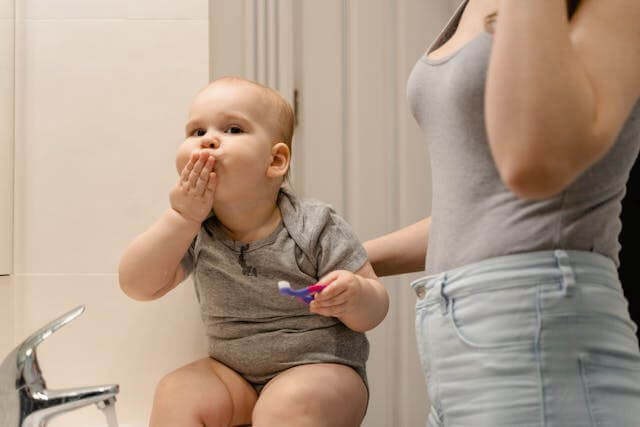One of the challenges with children’s dental health is that many parents wait till there is an obvious dental complaint before booking an appointment for their kids to see a dentist. Now, part of the confusion is that most parents don’t even know the right time to schedule their kids’ first dental visit. This is one of the main reasons many children are suffering from dental problems such as tooth decay.
As a parent, oral care for your children is a serious thing. That is why it is important to adopt preventive measures quite early. The American Academy of Paediatric Dentistry recommends that a child’s first dental appointment should be by their first birthday or 6 months after the first tooth erupts.
This first visit is very important as it helps the dentist to educate you on possible dental challenges your baby might have including dental caries and what can be done to prevent such problems.
Here are six major reasons why it is important for your child to make this dental appointment by their first birthday.
1. Nibs Tooth Decay in the Bud
Tooth decay is one of the most common dental problems in young children. According to the National Institute of Dental and Craniofacial Research, about 23% of children aged 2 to 5 years experience cavities in their primary teeth. This makes early appointment with a dentist crucial in preventing dental caries in children.
Many parents assume that baby teeth don’t need much care since they will eventually fall out. But what they don’t understand is that these tiny teeth play vital roles in the child’s mouth such as helping with chewing and speech development. More importantly, the primary teeth guide the erupting permanent teeth into place. That is why premature loss of a primary tooth due to tooth decay or other causes could lead to malalignment when the permanent teeth begin to erupt.
Babies and toddlers are at high risk of cavities because their teeth are often exposed to milk, formula, and juice. These liquids contain free sugar, which are important in the formation of tooth decay.
Scheduling an appointment for your child to see the dentist within their first birthday will help prevent dental caries and other dental problems. The dentist will check for any signs of decay and give advice on proper oral hygiene. They will teach you how to clean your baby’s gums and teeth, recommend fluoride treatments if needed, and guide you on the best feeding and drinking habits.
Preventing tooth decay in baby teeth is essential. If the decay is left untreated, it can spread, leading to infections that impact the child’s overall health. If a baby tooth is lost too soon, it can cause spacing issues, making future dental treatments more complicated.
2. Ensures Proper Tooth and Jaw Development
Your baby’s first teeth might be tiny, but they play a big role in their overall development. Baby teeth help with chewing, speaking, and even smiling. More importantly, they guide the permanent teeth into place. That’s why an early appointment with a dentist is so important. The doctor will examine and monitor the erupting teeth to ensure your child’s teeth and jaws are developing properly.
Sometimes, parents don’t notice small dental problems until they become serious. A baby’s teeth may erupt in an awkward position. The teeth may be relatively larger when compared to the available space in the jaw. These issues can lead to bite problems, speech delays, or difficulty in eating. A dentist can spot early signs of trouble and recommend solutions before the issues turn into major concerns.
Pacifier use, thumb-sucking, and other oral habits can also affect a baby’s teeth alignment. While these habits are normal in infants, prolonged use may cause dental problems. Oral habits can cause teeth to shift into wrong positions or jaws to develop abnormally. Your dentist will advise you on when and how you can assist your child break their oral habits. Dentists appreciates such appointment if it is within the child’s first birthday.
Regular checkups as your child grows allow the dentists to track your baby’s growth and suggest preventive measures that will be suitable for them. In some cases, simple changes like adjusting feeding habits or introducing fluoride can make a big difference. By catching problems early, you can help your baby avoid braces or other costly treatments in the future.
3. Teaches Parents Proper Baby Oral Hygiene
As a parent, you want to do everything right for your baby, including taking care of their teeth. But sometimes, it can be confusing to know exactly what to do. That’s why an appointment with a dentist is so essential for your baby. It gives you the opportunity to receive expert guidance on how to care for your baby’s oral health.
Many parents don’t realise that oral care begins even before the first tooth appears. A dentist can show you how to clean your baby’s gums properly using a soft cloth. Once the first tooth comes in, they will teach you the right way to brush, how often to do it, and whether or not fluoride is needed, and if required, the right amount that should be used for your baby.
Taking your kids to see a dentist gives you a chance to ask questions concerning their oral health. it also helps you learn how to make oral hygiene fun for them. Your dentist can suggest games, songs, or special toothbrushes to make brushing an enjoyable routine at home.
Teething is another challenge for many parents. Babies can experience pain, fussiness, and even disrupted sleep. A dentist allows you to ask about safe ways to soothe teething discomfort, which products to use, and what to avoid when you make an appointment.
4. Helps Your Baby Get Comfortable with Dental Visits
A visit to the dentist can feel scary for a child. This is common if it is the child’s first time or when they are already in pain. But when babies start visiting the dentist early, they get used to the experience in a positive way. This helps prevent fear and anxiety about dental visits as they grow older.
Your child’s appointment with a dentist is not just about checking their teeth, it is also about creating a friendly, stress-free introduction to dental care. When your baby visits the dentist while they are still young, they learn that it’s a normal part of life. They become familiar with the sights, sounds, and even the friendly faces of the dental team. This makes future checkups much easier and less stressful.
Children who don’t visit the dentist may develop dental anxiety, making future visits difficult. Fear of the dentist can lead to skipping an appointment, which increases the risk of cavities and other dental problems. By starting early to expose your kids to the dental environment, you help them build trust and confidence in dental care.
If you can, take your children along when you visit your dentist, especially for noninvasive procedures, it will also help them to get used to the dental environment.
5. Identifies Hidden Dental Issues Early
Not all dental problems are visible. Some issues start beneath the surface and may go unnoticed until they become serious. That’s why an early dental appointment is essential. It helps to detect hidden dental problems before they cause pain or long-term damage.
One common issue in babies is tongue-tie or lip-tie, where the tissue under the tongue or upper lip is too tight. This can make breastfeeding difficult and affect speech development later. A dentist can identify these conditions early and recommend simple treatments to prevent future complications.
Other hidden problems include weak enamel, gum problems, or teeth growing in the wrong direction. If left untreated, these issues can lead to cavities, discomfort, or difficulty eating. An early dental appointment ensures that any concerns are addressed before they worsen.
Some babies may also have an improper bite (malocclusion) from habits like thumb-sucking or pacifier use. A dentist can monitor jaw development and guide parents on how to correct these habits before they cause long-term alignment issues. Early detection saves time, money, and unnecessary pain. By taking your baby for regular checkups, you can ensure their teeth and gums stay healthy as they grow.
6. Saves Money on Costly Future Treatments
Many parents put off their baby’s first appointment with the dentist thinking it’s unnecessary. But delaying dental care can lead to serious problems and huge expenses later on. Early check ups help catch dental issues before they become complicated and cost so much for treatments.
An untreated tooth decay can lead to pain, infections, and even early tooth loss. If a baby’s tooth is lost too soon, it can cause teeth malalignment. Malaligned teeth can be corrected by orthodontic interventions. An appointment with the dentist during teeth and jaw developmental stages can prevent these complications and save you thousands in dental bills.
Preventative care is always cheaper than emergency treatment. Regular dental visits allow your dentist to suggest better oral care routines, and provide early solutions before problems become severe. This reduces the risk of expensive procedures like fillings, root canals, or extractions.
Many dental insurance plans cover early visits, making them an affordable investment in your baby’s health. Even if you don’t have insurance, paying for a routine checkup is far less expensive than treating severe dental issues.
By starting dental care early, you are not just protecting your baby’s smile you are also saving some money. A small step now can prevent big expenses in the future.
Conclusion
Research shows that children who keep an appointment with a dentist before the age of two require 3.58 fewer dental procedures over an eight-year period compared to those who start later. An early dental visit is one of the best things you can do for your baby’s health. It helps prevent cavities, and ensures proper tooth and jaw development. it will also afford you the opportunity to learn how to care for your baby’s teeth the right way.







